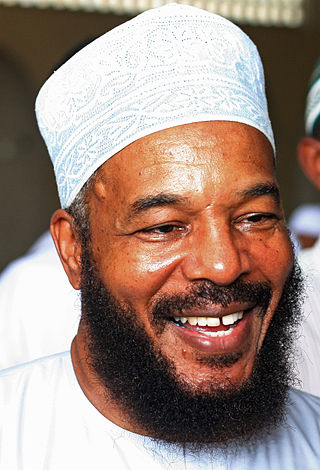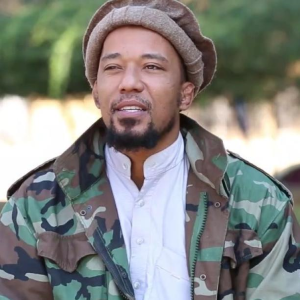Islamic terrorism refers to terrorist acts carried out by fundamentalist militant Islamists and Islamic extremists.

Al-Muhajiroun is a proscribed terrorist network based and banned in Saudi Arabia and active for many years in the United Kingdom. The founder of the group was Omar Bakri Muhammad, a Syrian who previously belonged to Hizb ut-Tahrir; he was not permitted to re-enter Britain after 2005. According to The Times, the organisation has been linked to international terrorism, homophobia, and antisemitism. The group became notorious for its September 2002 conference "The Magnificent 19", praising the September 11, 2001 attacks. The network mutates periodically so as to evade the law; it operates under many different aliases.

Anjem Choudary is a British Islamist who has been described as "the face" of militant Islamism or the "best known" Islamic extremist in Britain. He was sentenced to life imprisonment in 2024 after being found guilty of directing a terror organisation.

Abu Ameenah Bilal Philips is a Jamaican-born Canadian Islamic teacher, speaker, author, founder and chancellor of the International Open University, who lives in Qatar.

Jihadism is a neologism for militant Islamic movements that seek to base the state on Islamic principles. In a narrower sense, it refers to the belief held by some Muslims that armed confrontation with political rivals is an efficient and theologically legitimate method of socio-political change. It is a form of religious violence and has been applied to various insurgent Islamic extremist, militant Islamist, and terrorist individuals and organizations whose ideologies are based on the Islamic notion of lesser jihad from the classical interpretation of Islam. It has also been applied to various Islamic empires in history, such as the Rashidun and Umayyad caliphates of the early Muslim conquests, and the Ottoman Empire. There were also the Fula jihads in West Africa in the 18th and 19th centuries.

The Salafist Group for Preaching and Combat, known by the French acronym GSPC, was an Algerian islamist terrorist faction in the Algerian Civil War founded in 1998 by Hassan Hattab, a former regional commander of the Armed Islamic Group (GIA). After Hattab was ousted from the organization in 2003, the group officially pledged support for al-Qaeda, and in January 2007, the group officially changed its name to the "Al-Qaeda Organization in the Islamic Maghreb" (AQIM).

Islamic modernism is a movement that has been described as "the first Muslim ideological response to the Western cultural challenge", attempting to reconcile the Islamic faith with values perceived as modern such as democracy, civil rights, rationality, equality, and progress. It featured a "critical reexamination of the classical conceptions and methods of jurisprudence", and a new approach to Islamic theology and Quranic exegesis (Tafsir). A contemporary definition describes it as an "effort to re-read Islam's fundamental sources—the Qur'an and the Sunna, —by placing them in their historical context, and then reinterpreting them, non-literally, in the light of the modern context."

Salafi jihadism, also known as Salafi-jihadism, jihadist Salafism and revolutionary Salafism, is a religiopolitical Sunni Islamist ideology that seeks to establish a global caliphate. An extreme, jihadist interpretation of the broader Salafism movement, Salafi jihadism is characterized by the advocacy of physical violence against both non-Muslims, and self-proclaimed Muslims deemed to be heretics or apostates. In a narrower sense, jihadism refers to the belief that armed confrontation with political rivals is an efficient and theologically legitimate method of socio-political change. The Salafist interpretation of sacred Islamic texts is "in their most literal, traditional sense", which adherents claim will bring about the return to "true Islam".

The 2011 Frankfurt Airport shooting occurred on 2 March 2011 at Frankfurt Airport in Germany. The shooter, Arid Uka, was arrested and charged with killing two United States Airmen and seriously wounding two others. He was convicted of murder and attempted murder and sentenced to life in prison on 10 February 2012.

Denis Mamadou Gerhard Cuspert, also known by his stage name Deso Dogg and his nom de guerreAbu Talha al-Almani, was a German rapper who became a member of the Islamic State.

Salafi–Sufi relations refer to the religious, social and political relations between Salafis and Sufis, who represent two major scholarly movements which have been influential within Sunni Muslim societies. The debates between Salafi and Sufi schools of thought dominated the Sunni world since the classical era, splitting their influence across religious communities and cultures, with each school competing for scholarly authority via official and unofficial religious institutions. The relationship between Salafism and Sufism – two movements of Islam with different interpretations of Islam – is historically diverse and reflects some of the changes and conflicts in the Muslim world today.

Quasi-state-level jihadist groups, including Boko Haram and the Islamic State of Iraq and the Levant, have captured and enslaved women and children, often for sexual slavery. In 2014 in particular, both groups organised mass kidnappings of large numbers of girls and younger women.
The ideology of the Islamic State, unoffically referred to as Islamic Statism, has been described as being a blend of Salafism, Salafi jihadism, Sunni Islamist fundamentalism, Wahhabism, and Qutbism. Through its official statement of beliefs originally released by its first leader Abu Omar al-Baghdadi in 2007 and subsequently updated since June 2014, the Islamic State defined its creed as "a middle way between the extremist Kharijites and the lax Murji'ites".

The Faith Campaign was an Islamist campaign conducted by the Iraqi Ba'ath Party, beginning in 1993. The campaign involved a variety of policies, including greater freedoms being granted to Islamist groups, greater resources being put into religious programmes, increased use of Islamic punishments, and a greater emphasis being put on Islam in all sectors of Iraqi life.

The Sheikh Omar Hadid Brigade, also known as Islamic State in Gaza, was an Islamist militant group affiliated with the Islamic State in Iraq and the Levant that was reportedly active in the Gaza Strip around 2015. Its goals have consistently matched those of the Islamic State, in that it seeks to establish the al-Sham caliphate. As such, it opposes all forms of Palestinian nationalism while also supporting the elimination of all Jews and other ethno-religious 'infidels' from the region.
Moderate Muslim and Moderate Islam and are terms that are used within religious and political discourse to describe the obverse of Islamic extremism and imply that supporting Islamic terrorism is the characteristic of extremist groups within Islam, and the moderate groups of Muslims denounce extremist violence such as Islamic terrorism, Jihadism and radical Islamism.
Yunis Hunnar was a former leader of the Sheikh Omar Hadid Brigade, a Salafi Jihadist group based in the Gaza Strip which carries out attacks against both Hamas and Israel.

Starting in the mid-1970s and 1980s, Salafism and Wahhabism — along with other Sunni interpretations of Islam favored by the Kingdom of Saudi Arabia and other Gulf monarchies — achieved a "preeminent position of strength in the global expression of Islam."
Dawa FFM was an Islamist Salafi organisation based in Frankfurt, Germany that was founded in 2008. The most prominent preacher of the group was Abdellatif Rouali, who was under investigation by German authorities for recruitment of jihadists.
The 2016 conference on Sunni Islam in Grozny was convened to define the term "Ahl al-Sunnah wa al-Jama'ah", i.e. who are "the people of Sunnah and majority Muslim community", and oppose Takfiri groups. The conference was held in the Chechen Republic capital of Grozny from 25 to 27 August 2016, sponsored by the president of Chechnya, Ramzan Kadyrov, and attended by approximately 200 Muslim scholars from 30 countries, especially from Russia, Egypt, Syria, Libya, Kuwait, Sudan, Jordan, etc. at the invitation of Yemeni scholar, Ali al-Jifri.










